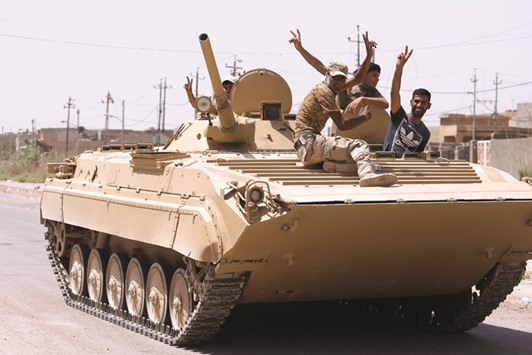Upcoming military offensives in Iraq against Islamic State, including an assault on the northern city of Mosul, could displace at least 2.3mn people, the United Nations humanitarian co-ordinator for Iraq said yesterday.
The prediction of such a vast humanitarian emergency creates additional complications for the Iraqi government and its US allies, who have announced plans for offensives to drive Islamic State fighters this year from most of their Iraqi territory.
More than 3.4mn people across Iraq have already been forced by conflict to leave their homes, according to the United Nations.
In the past month, 85,000 people fled Fallujah, an Islamic State stronghold an hour’s drive from Baghdad, amid a military campaign that has recaptured large parts of the city.
Most of the displaced are from Iraq’s minority Sunni community, raising concerns among officials that US-backed military gains against Islamic State will not bring stability to Iraq more than 13 years after a US-led invasion toppled Saddam Hussein, a Sunni.
Islamic State fighters swept through much of northern and western Iraq two years ago and declared a caliphate to rule over territory there and in neighbouring Syria.
The jihadists have lost ground in recent weeks to a number of enemies on several fronts in both countries, with the main battles still looming for the caliphate’s two de facto capitals, Mosul in Iraq and Raqqa in Syria.
Lise Grande, the UN humanitarian co-ordinator for Iraq, told Reuters in an interview that at least 430,000 more people could be displaced this year in Anbar, Iraq’s sprawling desert province stretching west from Fallujah to the Syrian border.
Government forces have retaken several cities in Anbar from Islamic State in the past six months and are still pressing up the Euphrates river valley towards the border town of Qaim.
Grande said another 830,000 people would be displaced along “the Mosul corridor”, stretching more than 100km from northern Salahuddin province towards the Islamic State stronghold.
In Mosul itself, by far the largest city under the militants’ control, the worst case scenario could see 1mn people displaced, said Grande.
The United Nations projects the Mosul operation will be larger and more complex than any other humanitarian operation in the world this year.
“We’re literally talking in just a few months about doubling the number of families who are displaced in the country,” she said. “We’re trying to pre-position supplies and develop contingencies for all of those areas and we’re doing so with 30% of the appeal that we’ve asked for.”
The humanitarian community this year requested $861mn to assist 7.3mn Iraqis in need across the country, but so far it has only received about $266mn.
Iraq’s cash-strapped government, hit by low oil prices and increased military costs, has struggled to help.
Government-run camps are overflowing with Fallujah escapees who trekked several kilometres past Islamic State snipers and minefields in sweltering heat to find there was not even shade.
Grande said the humanitarian community, which has not had access to the city since the militants seized control in early 2014, had underestimated the number of civilians trapped inside by more than half.
Camps were overflowing within the first ten days of the assault, prompting the UN to redirect stocks from other parts of the country, including some put in place for the Mosul campaign, she said.
“We did not have enough prepared,” she said.”The needs are far outstripping our capacity.”
Many people at three main displacement sites near Fallujah are stranded out in the open or packed with several families in a tent meant for six people.
Grande said with temperatures likely to top 50 Celsius in coming weeks, the top priority was shelter, alongside water, food, hygiene and healthcare.
“In this heat, if families aren’t safely inside of tents, we have to worry about their position,” she said. “If we don’t get more assistance, we have to face the fact that conditions could deteriorate very sharply.”

Iraqi soldiers gesture from a top of a tank in Fallujah.
